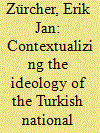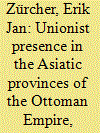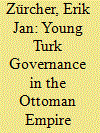| Srl | Item |
| 1 |
ID:
177698


|
|
|
|
|
| Summary/Abstract |
The national resistance movement that emerged in Anatolia and Thrace immediately after the end of World War I and that was eventually successful in overturning the peace settlement imposed on the Ottoman Empire by the victorious Entente, has become such an important part of the history of the emergence of the Turkish nation state, that it is studied almost exclusively in that context: as republican prehistory. As a result almost no effort has been made to locate it within the major global developments of the era. This article tries to remedy this by analysing statements coming out of the resistance leadership over the years 1918-1921 to establish where it fits the ideological currents of the day. It concludes that four major inputs can be discerned: loyalty to the Ottoman monarchy and state; Muslim nationalism; Wilsonian self-determination, and Boslevik-inspired anti-imperialism. These influences were not mutually exclusive. Apart from being influenced by contemporary ideological currents, the National Movement was also an influencer: as a movement to preserve an existing state (and not to create or carve out a new one) it was also a pioneer of the revisionist movements of the interbellum that aimed to undo the Paris peace arrangements.
|
|
|
|
|
|
|
|
|
|
|
|
|
|
|
|
| 2 |
ID:
192271


|
|
|
|
|
| Summary/Abstract |
This article investigates the way the Young Turk Committee of Union and Progress, which was essentially an organisation with roots in the European provinces of the Ottoman Empire and in the Western Anatolian province of Aydın, established itself in the provincial centres of Eastern Anatolia and the Arab provinces after the revolution of July 1908. It then seeks out the patterns that can be discerned in the composition of the local branches, and in the relationships of these branches with the committee’s centre (first in Salonica, then in Constantinople) on the one hand, and with the local Muslim elites and non-Muslim communities on the other.
|
|
|
|
|
|
|
|
|
|
|
|
|
|
|
|
| 3 |
ID:
168367


|
|
|
|
|
| Summary/Abstract |
The article analyses the system of government of the Ottoman Empire during the First World War by looking at three elements: the constitutional-parliamentarian monarchy, the Committee of Union and Progress and the army. The analysis takes place along two axes: one in which the functioning of, and the power relations between, the different institutional elements are analysed, and one based on a series of case studies of important decision-making moments of the years 1914–18.
The civil-military relations as they developed during the war years are studies in a comparative framework. The Ottoman situation is analysed against the backdrop of changes in the balance of power between military and civilian authorities in other belligerent countries in Europe.
|
|
|
|
|
|
|
|
|
|
|
|
|
|
|
|
| 4 |
ID:
164900


|
|
|
|
|
| Summary/Abstract |
This article consists of a comparative analysis on the one hand, and an attempt to trace influences and connections, on the other. In the comparative part, it seeks to determine the place of the Ottoman constitutional revolution of July 1908 in the global wave of revolutions in the decade before the First World War. It accepts that there is a high degree of similarity in the liberal constitutionalist ideology of the revolutionary movements, but emphasizes the differences in the social bases of the revolutionary movements. In the part on connections, the influences on the Young Turks' ideology, organisation and revolutionary methodology are traced, as well as the influence they exerted on other revolutionary movements.
|
|
|
|
|
|
|
|
|
|
|
|
|
|
|
|